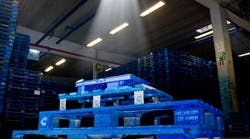As a global provider of pallet and container pooling solutions, CHEP has achieved savings through the installation of energy-efficient Atlas Copco compressors at its pallet production and repair sites in the United Kingdom. The energy savings from the installation have been measured at more than 1,000 tonnes of CO2 emissions.
CHEP specializes in managed, returnable, and reusable packaging solutions, serving many of the world’s manufacturers in sectors such as consumer goods, fresh produce, beverage, and automotive. Its service is environmentally sustainable and increases efficiency for customers, while reducing operating risk and product damage. CHEP’s 7,000-plus employees and about 300 million pallets and containers offer unbeatable coverage and exceptional value, supporting more than 500,000 customer touch-points in more than 50 countries. Its customer portfolio includes companies and brands such as Unilever, Procter & Gamble, Sysco, Kellogg's, Kraft, Nestlé, Ford, and GM.
CHEP has a sophisticated network of service-center facilities strategically located across the United Kingdom where pallets are returned, inspected, and repaired before being reissued in to the supply chain. Seven of these plants have installed Atlas Copco equipment, including 8-9 bar compressed air that’s used to transport the wooden pallets around the inspection and repair process. There are also two air-driven nail guns on each repair bench and an average of 20 benches at each site. Together, these installations have helped to optimize the compressed air system used in all sites, as well as eliminate air leaks.
As a sustainable and environmentally aware organization, CHEP is committed to minimize its energy demand and carbon footprint. Subsequently, the company’s U.K. site managers undertook an 18-month review of energy efficiency and CO2 emissions at the company’s process plants. The project included the monitoring and assessment of compressor system efficiency at the seven service-center sites.
At the end of 2011, CHEP installed a number of new Atlas Copco GA-series rotary screw compressors at five of its sites and transferred other existing units between the company’s remaining two sites. All of the Atlas Copco machines installed featured variable speed drive (VSD) technology that matches compressor output to fluctuating demand, with the potential to realize consequent energy savings in the region of 35%. CHEP also chose to support the new VSD compressors and the existing machines with an Atlas Copco Comfort Air service and maintenance package handled by Compressor Engineering.
“Our relationship with Atlas Copco in the UK is fantastic, and the whole project has been a resounding success,” says Simon Wood, plant manager at CHEP’s Pontefract Service Center and manager of the compressor-upgrade project. “The service and leaving-no-stone-unturned approach from Atlas Copco has been incredibly thorough, and the performance that the machines has delivered has contributed to our sustainability objectives across the business.”
